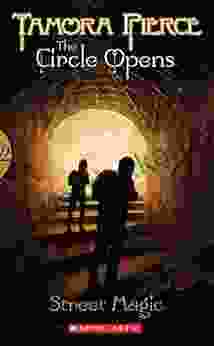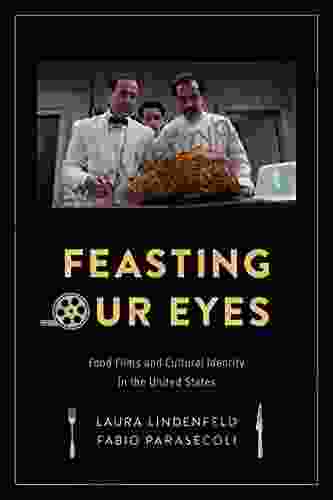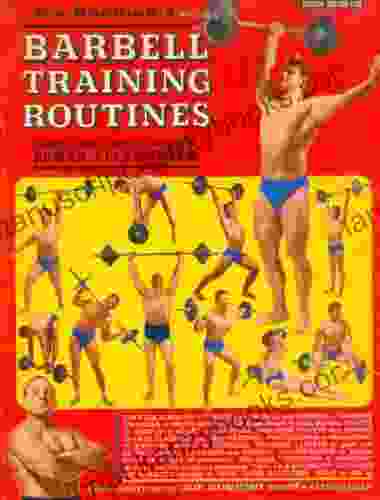Food Films and Cultural Identity in the United States: An Exploration of the Relationship Between Culinary Cinema and National Identity

4.2 out of 5
| Language | : | English |
| File size | : | 2002 KB |
| Text-to-Speech | : | Enabled |
| Screen Reader | : | Supported |
| Enhanced typesetting | : | Enabled |
| Word Wise | : | Enabled |
| Print length | : | 282 pages |
Food films have long been a popular genre in the United States, from early silent films like "The Great Train Robbery" (1903) to more recent blockbusters like "Julie & Julia" (2009) and "The Chef" (2014). These films have explored a wide range of themes, from the importance of family and community to the challenges of immigration and assimilation. But what is it about food that makes it such a powerful lens for exploring American culture and identity?
In this article, we will explore the relationship between food films and cultural identity in the United States. We will examine how food films have reflected and shaped American values and beliefs, and how they have contributed to our understanding of ourselves as a nation.
The History of Food Films in the United States
The history of food films in the United States can be traced back to the early days of cinema. In 1903, Edwin S. Porter released "The Great Train Robbery," a silent film that featured a scene in which a group of bandits rob a train and then share a meal of beans and coffee. This scene was one of the first examples of food being used in a film to create a sense of community and belonging.
In the years that followed, food films continued to be produced in the United States, although they were often relegated to the status of B-movies or exploitation films. However, in the 1970s, there was a resurgence of interest in food films, led by directors such as John Cassavetes and Robert Altman. These directors used food to explore themes of family, community, and identity in their films.
In the 1980s and 1990s, food films became increasingly popular with mainstream audiences. Films such as "Big Night" (1996) and "Eat Drink Man Woman" (1994) were critical and commercial successes, and they helped to raise the profile of food films in the United States.
Today, food films are more popular than ever before. They are produced by major studios and independent filmmakers alike, and they cover a wide range of genres, from comedies to dramas to documentaries. Food films have become a powerful force in American culture, and they continue to shape our understanding of ourselves as a nation.
Food and American Identity
Food is essential to American identity. It is a way for us to connect with our families, our communities, and our country. Food is also a way for us to express our values and beliefs. For example, the Thanksgiving meal is a symbol of family and community, and the Fourth of July barbecue is a symbol of patriotism.
Food films have played a major role in shaping our understanding of food and its role in American culture. These films have shown us how food can be used to create a sense of belonging, to express our values, and to explore our identities.
Some of the most iconic food films in American cinema include:
- "The Great Train Robbery" (1903)
- "The Grapes of Wrath" (1940)
- "Babette's Feast" (1987)
- "Big Night" (1996)
- "Eat Drink Man Woman" (1994)
- "Julie & Julia" (2009)
- "The Chef" (2014)
These films have explored a wide range of themes related to food and American identity, including:
- The importance of family and community
- The challenges of immigration and assimilation
- The role of food in defining our values and beliefs
- The power of food to create a sense of belonging
Food films have helped us to understand how food is connected to our sense of self and our place in the world. These films have also helped us to appreciate the diversity of American food culture and the ways in which food can be used to bring people together.
Food films are a powerful force in American culture. They have shaped our understanding of food and its role in our lives, and they have helped us to explore our identities as a nation. Food films are a valuable resource for anyone who wants to learn more about American culture and history.
If you are interested in learning more about food films, I recommend checking out the following resources:
- IMDb's list of the best food films
- Rotten Tomatoes' list of the top 100 food films
- Eater's list of the best food movies
4.2 out of 5
| Language | : | English |
| File size | : | 2002 KB |
| Text-to-Speech | : | Enabled |
| Screen Reader | : | Supported |
| Enhanced typesetting | : | Enabled |
| Word Wise | : | Enabled |
| Print length | : | 282 pages |
Do you want to contribute by writing guest posts on this blog?
Please contact us and send us a resume of previous articles that you have written.
 Book
Book Novel
Novel Page
Page Chapter
Chapter Text
Text Story
Story Genre
Genre Reader
Reader Library
Library Paperback
Paperback E-book
E-book Magazine
Magazine Newspaper
Newspaper Paragraph
Paragraph Sentence
Sentence Bookmark
Bookmark Shelf
Shelf Glossary
Glossary Bibliography
Bibliography Foreword
Foreword Preface
Preface Synopsis
Synopsis Annotation
Annotation Footnote
Footnote Manuscript
Manuscript Scroll
Scroll Codex
Codex Tome
Tome Bestseller
Bestseller Classics
Classics Library card
Library card Narrative
Narrative Biography
Biography Autobiography
Autobiography Memoir
Memoir Reference
Reference Encyclopedia
Encyclopedia Terri Blackstock
Terri Blackstock Massoud Mahmoudi
Massoud Mahmoudi Fred Beisse
Fred Beisse Sharynne Macleod Nicmhacha
Sharynne Macleod Nicmhacha Jon Margulies
Jon Margulies Nizar Souayah
Nizar Souayah Karen Ingalls
Karen Ingalls Paul Pearsall
Paul Pearsall Fabrizia Lanza
Fabrizia Lanza Quotable Wisdom
Quotable Wisdom Fabiano Liborio
Fabiano Liborio Nancy Tatom Ammerman
Nancy Tatom Ammerman Riley Weber
Riley Weber Heilkunde Akademie
Heilkunde Akademie Neil Gaiman
Neil Gaiman Jennifer Bright Reich
Jennifer Bright Reich Thalassa Skinner
Thalassa Skinner Eugenia Zukerman
Eugenia Zukerman Erika Janik
Erika Janik Erika Owen
Erika Owen
Light bulbAdvertise smarter! Our strategic ad space ensures maximum exposure. Reserve your spot today!

 Tennessee WilliamsStreet Magic: The Circle Opens - A Timeless Masterpiece for Aspiring...
Tennessee WilliamsStreet Magic: The Circle Opens - A Timeless Masterpiece for Aspiring... Yasushi InoueFollow ·10.6k
Yasushi InoueFollow ·10.6k Allen ParkerFollow ·8.9k
Allen ParkerFollow ·8.9k Billy PetersonFollow ·4k
Billy PetersonFollow ·4k Ethan MitchellFollow ·8.5k
Ethan MitchellFollow ·8.5k Stan WardFollow ·13.2k
Stan WardFollow ·13.2k Holden BellFollow ·11.6k
Holden BellFollow ·11.6k Federico García LorcaFollow ·19.9k
Federico García LorcaFollow ·19.9k Mario SimmonsFollow ·14.8k
Mario SimmonsFollow ·14.8k

 Ivan Turgenev
Ivan TurgenevUnlock Your Thyroid's True Potential: Healing Hashimoto...
The Empowering...

 Patrick Hayes
Patrick HayesBeyond Hot Yoga: Journey into the Depths of Patterns,...
Beyond the sweltering heat of a hot yoga...

 Mike Hayes
Mike HayesFor Dynamic Power Superior Athletic Performance And...
Unleash the Power Within:...

 Jason Reed
Jason ReedUnveiling the Enigma of Glaucoma: A Comprehensive Guide...
Glaucoma, a leading cause of irreversible...

 Michael Chabon
Michael ChabonHebridean Sea Swimmers: Gress Beach
A Journey into...

 Drew Bell
Drew BellJourney to Healing: A Bridge to Hope and Restoration
In the tapestry of life, we encounter...
4.2 out of 5
| Language | : | English |
| File size | : | 2002 KB |
| Text-to-Speech | : | Enabled |
| Screen Reader | : | Supported |
| Enhanced typesetting | : | Enabled |
| Word Wise | : | Enabled |
| Print length | : | 282 pages |










